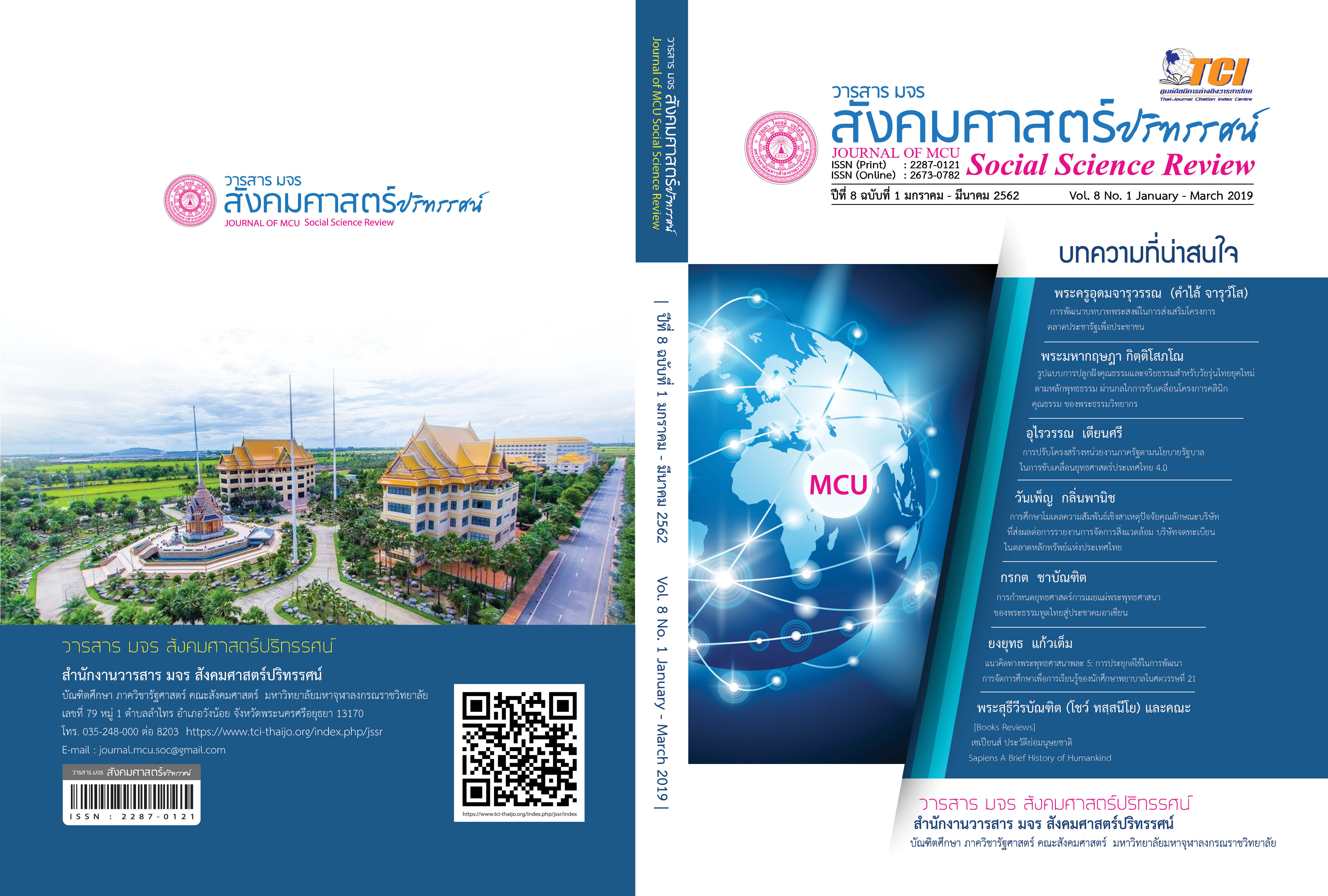การประยุกต์หลักพระพุทธศาสนาเพื่อการจัดการศึกษาทางด้านจิตวิทยา ของมหาวิทยาลัยมหาจุฬาลงกรณราชวิทยาลัย
คำสำคัญ:
การประยุกต์,พระพุทธศานา,การจัดการศึกษาด้านจิตวิทยาบทคัดย่อ
การวิจัยมีวัตถุประสงค์ 1) เพื่อศึกษาข้อมูลทั่วไปของผู้ประยุกต์หลักพระพุทธศาสนาเพื่อการจัดการศึกษาทางด้านจิตวิทยาของมหาวิทยาลัยมหาจุฬาลงกรณราชวิทยาลัย เน้นข้อมูลทั่วไปของผู้ประยุกต์หลักพระพุทธศาสนา ประกอบด้วย สถานภาพ ประสบการณ์การบริหารหลักสูตร วุฒิการศึกษา และตำแหน่งทางวิชาการ 2) เพื่อวิเคราะห์ผลการประเมินการประยุกต์หลักพระพุทธศาสนาเพื่อการจัดการศึกษาทางด้านจิตวิทยาของมหาวิทยาลัยมหาจุฬาลงกรณราชวิทยาลัย 3) เพื่อเสนอแนวทางในการพัฒนาและปรับปรุงการประยุกต์หลักพระพุทธศาสนาเพื่อการจัดการศึกษาทางด้านจิตวิทยาของมหาวิทยาลัยมหาจุฬาลงกรณราชวิทยาลัย การวิจัยนี้เป็นการวิจัยเชิงผสมวิธีระหว่างเชิงปริมาณและคุณภาพ โดยใช้แบบประเมินเป็นเครื่องมือเก็บรวบรวมข้อมูลเชิงปริมาณ จากผู้ทรงคุณวุฒิ จำนวน 5 ท่าน ผู้บริหาร 5 รูป/คน อาจารย์ 10 รูป/คน นิสิต 20 รูป/คน รวมทั้งสิ้น 40 รูป/คน ใช้แบบสัมภาษณ์เชิงลึกและการสนทนากลุ่มเก็บรวบรวมข้อมูลเชิงคุณภาพ การวิเคราะห์ข้อมูลเชิงปริมาณใช้สถิติ ค่าร้อยละ ค่าเฉลี่ย และค่าเบี่ยงเบนมาตรฐาน วิเคราะห์ข้อมูลเชิงคุณภาพโดยการวิเคราะห์เชิงเนื้อหา
ผลการวิจัยพบว่า
1.ข้อมูลทั่วไปของผู้ประยุกต์หลักพระพุทธศาสนาเพื่อการจัดการศึกษาทางด้านจิตวิทยาของมหาวิทยาลัยมหาจุฬาลงกรณราชวิทยาลัย พบว่า ผู้ทรงคุณวุฒิส่วนใหญ่เป็นคฤหัสถ์ ร้อยละ 80.00 มีประสบการณ์บริหารหลักสูตร 10 ปี ขึ้นไป ร้อยละ 100.00 ส่วนใหญ่มีตำแหน่งทางวิชาการระดับรองศาสตราจารย์ ร้อยละ 80.00 ผู้ตอบแบบประเมินที่เป็นผู้บริหารส่วนใหญ่เป็นคฤหัสถ์ ร้อยละ 60.00 มีประสบการณ์บริหารหลักสูตร 10 ปีขึ้นไป ร้อยละ 80.00 ส่วนใหญ่มีตำแหน่งทางวิชาการระดับผู้ช่วยศาสตราจารย์ ร้อยละ 80.00 ผู้ตอบแบบประเมินที่เป็นอาจารย์ส่วนใหญ่เป็นคฤหัสถ์ ร้อยละ 70.00 มีประสบการณ์บริหารหลักสูตร 10 ปีขึ้นไป ร้อยละ 50.00 ส่วนใหญ่มีตำแหน่งทางวิชาการระดับผู้ช่วยศาสตราจารย์ ร้อยละ 50.00 ผู้ทรงคุณวุฒิ ผู้บริหารและอาจารย์ส่วนใหญ่มีวุฒิการศึกษาระดับปริญญาเอก ร้อย 100.00 และผู้ตอบแบบประเมินที่เป็นนิสิตส่วนใหญ่คฤหัสถ์ ร้อยละ 85.00 ส่วนใหญ่เป็นเพศหญิง ร้อยละ 70.00 และเป็นเพศชาย ร้อยละ 30.00 ส่วนใหญ่มีอายุ 30 ปีขึ้นไป และส่วนใหญ่ประกอบอาชีพก่อนแล้วที่จะเข้ามาเรียน ร้อยละ 100.00
2.ผลการวิเคราะห์ผลการประเมินการประยุกต์หลักพระพุทธศาสนาเพื่อการจัดการศึกษาทางด้านจิตวิทยาของมหาวิทยาลัยมหาจุฬาลงกรณราชวิทยาลัย พบว่า 1) ผลการวิเคราะห์การประเมินด้านบริบทของหลักสูตร ประกอบด้วย (1) การประเมินความสัมพันธ์ สอดคล้องของหลักสูตรในด้านบริบทโดยผู้ทรงคุณวุฒิในภาพรวม มีผลคะแนนเฉลี่ย 0.80 เมื่อพิจารณารายข้อพบว่า ข้อที่มีค่าความสอดคล้อง มากที่สุด 3 อันดับแรก ได้แก่หลักสูตรมีความสัมพันธ์กับวัตถุประสงค์ของคณะ หลักสูตรมีความสัมพันธ์กับความต้องการของประเทศ และวัตถุประสงค์ของหลักสูตรมีความเหมาะสม ตามลำดับ (2) ความคิดเห็นของผู้บริหาร อาจารย์และนิสิตด้านบริบทของหลักสูตรในภาพรวม มีค่าเฉลี่ยอยู่ในระดับมากที่ 4.16 2) ผลการวิเคราะห์การประเมินด้านปัจจัยนำเข้า ประกอบด้วย (1) ความคิดเห็นของผู้บริหาร อาจารย์และนิสิตเกี่ยวกับด้านการประเมินด้านโครงสร้างหลักสูตรและด้านความเหมาะสมของรายวิชาในหลักสูตรในภาพรวม มีค่าเฉลี่ยอยู่ในระดับมากที่ 3.90 (2) ความคิดเห็นของผู้บริหาร อาจารย์และนิสิต เกี่ยวกับความเหมาะสมของรายวิชาในหลักสูตรในภาพรวมทั้งสิ้น มีค่าเฉลี่ยอยู่ในระดับมากที่ 3.91 (3) ความคิดเห็นของผู้บริหาร อาจารย์และนิสิตด้านคุณลักษณะของอาจารย์ในภาพรวม มีค่าเฉลี่ยอยู่ในระดับมากที่ 4.26 (4) ความคิดเห็นของผู้บริหาร อาจารย์และนิสิตด้านความพร้อมของนิสิตในภาพรวม มีค่าเฉลี่ยอยู่ในระดับมากที่ 3.88 (5) ความคิดเห็นของผู้บริหาร อาจารย์และนิสิตด้านสิ่งสนับสนุนการเรียนรู้ในภาพรวม มีค่าเฉลี่ยอยู่ในระดับมากที่ 3.74 3) ผลการวิเคราะห์การประเมินด้านกระบวนการเกี่ยวกับความคิดเห็นของผู้บริหาร อาจารย์และนิสิตด้านความเหมาะสมของกระบวนการบริหารหลักสูตร และด้านความเหมาะสมของการจัดการเรียนการสอนในภาพรวม มีค่าเฉลี่ยอยู่ในระดับมากในทุกด้าน 4) ผลการวิเคราะห์การประเมินด้านผลผลิตในภาพรวมมีค่าเฉลี่ยอยู่ในระดับมากที่สุด เมื่อพิจารณาในแต่ละด้าน พบว่า ด้านคุณธรรมจริยธรรม ด้านความรู้ ด้านทักษะทางปัญญา ด้านทักษะความสัมพันธ์ระหว่างบุคคลและความรับผิดชอบ ด้านทักษะการคิดวิเคราะห์เชิงตัวเลข การสื่อสาร และการใช้เทคโนโลยีสารสนเทศ และด้านอัตลักษณ์บัณฑิต “มีศรัทธาอุทิศตนเพื่อพระพุทธศาสนา” มีค่าเฉลี่ยอยู่ในระดับมากตามลำดับ
3. แนวทางในการพัฒนาและปรับปรุงการประยุกต์หลักพระพุทธศาสนาเพื่อการจัดการศึกษาทางด้านจิตวิทยาของมหาวิทยาลัยมหาจุฬาลงกรณราชวิทยาลัย พบว่า หลักสูตรควรมีอัตลักษณ์ด้านพุทธจิตวิทยาชัดเจน เน้นกรรมฐานเป็นวิธีการพุทธจิตวิทยาบำบัด ควรเน้นให้นิสิตได้ศึกษาด้วยตนเองและลงมือปฏิบัติให้มากกว่าการจัดการเรียนการสอนในชั้นเรียน อาจารย์ประจำหลักสูตรต้องมีผลงานวิจัยและต้องพัฒนาผลงานทางวิชาการ ตามเกณฑ์ที่ สกอ. กำหนดอย่างต่อเนื่อง บัณฑิตที่สำเร็จการศึกษาควรเป็นแบบอย่างที่ดี มีคุณธรรมจริยธรรมและมีความรับผิดชอบ สามารถบูรณาการความรู้ด้านพระพุทธศาสนากับศาสตร์ทางด้านจิตวิทยาได้อย่างดี
เอกสารอ้างอิง
Everyday Life. New York. Basic Books.
David L Mc. Mahan. Buddhism in The Modern World. Routledge. 2012 Gilley Jerry W. and Eggland. Steven A. (1990). Principles of Human Resource Development. New York: Addison Wesley.
Henson. (1995) Curriculum Development for Education Reform. New York:
Longman.
Jittipip Chuerattanapong (1996) The Curriculum Development: Principles and Practices. Bangkok: Alina Press.
Normal L. Munn. (1962). Introduction to Psychology. Boston: Houghton Mifflin
Co.
Nyanatiloka. (1980) Manual of Buddhism Terms and Doctrines. Kandy: Buddhist Publication Society.
Phattaraporn Aranyapha and Her Team (2008) “An Assessment Of Nursing Science
Program Faculty Of Nurse Siam University (Revised 2001)” Journal of Nursing And Education. Year 1, No. 3 (September-December 2008)
Phil Henry. Adaptation and Developments in Western Buddhism Socially
Engaged Buddhism in The UK. Bloomsbury London. 2013.
Teerasak Unarromlert and His Team (2009) “A Course Evaluation of Masterof
Education for Department of Education Silpakorn University Sanam Chan Palace Campus” (Research Report). Silpakorn University.
Thissana Khammani. (1985). In Somwangphithiyanuvat (Editor). Project Evaluation
Paper, Volume 4. Bangkok: Chulalongkorn University Press.
ดาวน์โหลด
เผยแพร่แล้ว
รูปแบบการอ้างอิง
ฉบับ
ประเภทบทความ
สัญญาอนุญาต
ลิขสิทธิ์ (c) 2019 วารสาร มจร สังคมศาสตร์ปริทรรศน์

อนุญาตภายใต้เงื่อนไข Creative Commons Attribution-NonCommercial-NoDerivatives 4.0 International License.
เพื่อให้เป็นไปตามกฎหมายลิขสิทธิ์ ผู้นิพนธ์ทุกท่านต้องลงลายมือชื่อในแบบฟอร์มใบมอบลิขสิทธิ์บทความให้แก่วารสารฯ พร้อมกับบทความต้นฉบับที่ได้แก้ไขครั้งสุดท้าย นอกจากนี้ ผู้นิพนธ์ทุกท่านต้องยืนยันว่าบทความต้นฉบับที่ส่งมาตีพิมพ์นั้น ได้ส่งมาตีพิมพ์เฉพาะในวารสาร มจร สังคมศาสตร์ปริทรรศน์ เพียงแห่งเดียวเท่านั้น หากมีการใช้ภาพหรือตารางหรือเนื้อหาอื่นๆ ของผู้นิพนธ์อื่นที่ปรากฏในสิ่งตีพิมพ์อื่นมาแล้ว ผู้นิพนธ์ต้องขออนุญาตเจ้าของลิขสิทธิ์ก่อน พร้อมทั้งแสดงหนังสือที่ได้รับการยินยอมต่อบรรณาธิการ ก่อนที่บทความจะได้รับการตีพิมพ์ หากไม่เป็นไปตามข้อกำหนดเบื้องต้น ทางวารสารจะถอดบทความของท่านออกโดยไม่มีข้อยกเว้นใดๆ ทั้งสิ้น





